Slideshow: Flying geese, Sean Gutierrez | Spencer B. Beebee and Cecil Paul (Wa’xaid), Gary Irving | Nathan Kadish, Bob Friedman, and other staff and board members during a field trip to Tryon Creek State Park, Sean Gutierrez | Staff and board members listen to a panel of staff and partners at Wapato Island Farm, Jason Hill
Ecotrust is committed to the ongoing work of embedding racial equity throughout our organization and our programmatic strategies. We recognize that dismantling systemic racism, classism, gender inequity, and other interlocking forms of oppression are central to our efforts to advance ecological lands and water stewardship, promote climate resilience, and build broadly shared intergenerational wealth.
In order for our work to be successful, we recognize the need to pursue collaborative efforts that are grounded in our partners’ visions of success, consider the structural barriers to advancing those visions, and recognize the keys to transformative change lie within the communities most affected by intertwined economic, climate, and racial injustices.
Below, explore how we are moving to center
equity at Ecotrust:
The ORIGINS OF EQUITY AT ECOTRUST
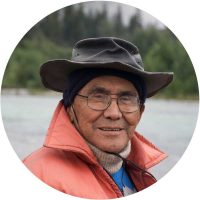
The currents against us were very strong. But I believed we could reach our destination. And that we had to for our survival.
—Cecil Paul (Wa’xaid), Haisla First Nation hereditary elder
Ecotrust’s earliest work began in the Kitlope, partnering with the Haisla First Nation to protect one of the last pristine temperate rainforest watersheds in the world. Our continued partnerships with Indigenous leaders and communities shaped an early version of our mission statement, which called out social equity alongside economic opportunity and environmental well-being as Ecotrust’s reason for being.
For instance, while Ecotrust has longstanding relationships with tribes across the bioregion, for decades we neglected to nurture relationships and build equitable partnerships in Black and other communities of color. We took far too long to identify racial equity as an imperative that is central to our work to advance economic opportunity and environmental well-being. For much of our history, inequities in organizational culture, policies, and practices, have created barriers that prevent Black and Brown people from entering and thriving in our workplace. In addition, we have often promoted market-based approaches to conservation and development without interrogating the ways in which the capitalist market system, being founded on theft of land and labor, is built on racial, gender, and class inequities and relies on ongoing oppression for its very existence.
In 2014, recognizing the need for transformative change, an informal group of staff began meeting, learning, and organizing and eventually pushed for the creation of the Equity Working Group (EWG). From 2017 through the end of 2021, the EWG served as one of the primary driving forces for change and holding Ecotrust accountable for progress. During this formative period, the EWG challenged white dominant cultural norms; conventional leadership and power structures; and the existence, support, and defense of exclusive and inequitable processes.
Through the leadership of the EWG and in deep collaboration with key people and teams across the organization, Ecotrust worked to shift culture; transform hiring and promotion practices and outcomes; support Black, Indigenous, and people of color (BIPOC) leadership; and make critical investments in staff time and capacity to begin the long-haul work of embedding racial equity throughout the organization and our programmatic strategies.
Gaining momentum
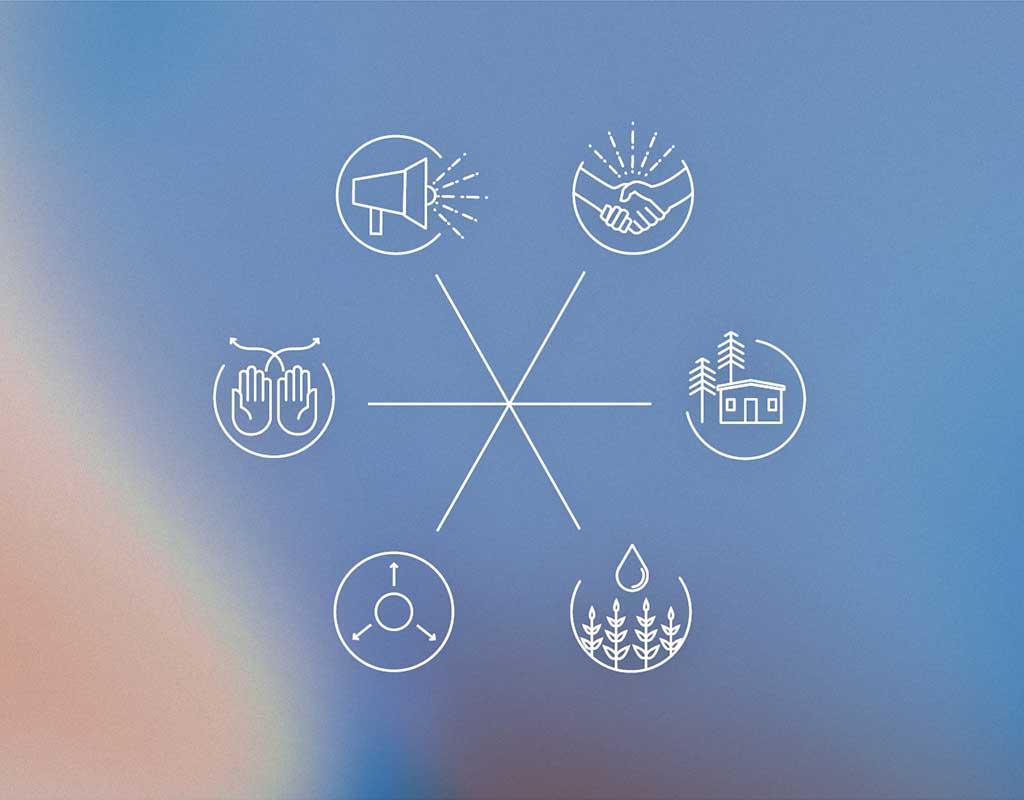
Icons representing the six goals of Ecotrust’s five-year Strategic Plan
In 2021, Ecotrust developed a five-year Strategic Plan, which identified the need for the ongoing work of advancing anti-racism and building a culture of belonging to be meaningfully distributed across the organization, at every level and on every team. This marked a shift away from the tendency to compartmentalize strategic planning and racial equity into separate scopes of work. At Ecotrust, the two are integrated. Our Strategic Plan is operationalized through an annual racial equity action plan.
In addition, at the end of 2021, we intentionally and explicitly shifted away from equity work being the responsibility of a committee (the EWG), which often resulted in a subset of mostly BIPOC staff holding disproportionate responsibility in driving those efforts forward.
Today, we expect all staff and board members to collectively contribute to these efforts and hold responsibility for moving this work forward.
We believe that everyone can become a changemaker in our organization, collectively contribute to these efforts, and hold responsibility for moving this work forward. We equip all staff and board members with the training, tools, and practiced experience to advance racial and gender justice outcomes internally and externally, through our collaborative efforts across the bioregion. We offer all staff professional development funds and provide mandatory anti-oppression training on a variety of topics throughout the year. In addition, staff self-organize Anti-Racism Learning & Action Groups that provide opportunities to strengthen our racial equity competencies and develop our ability to recognize and interrupt racism, cisgenderism, ableism, and other forms of oppression.
Building a multiracial organization
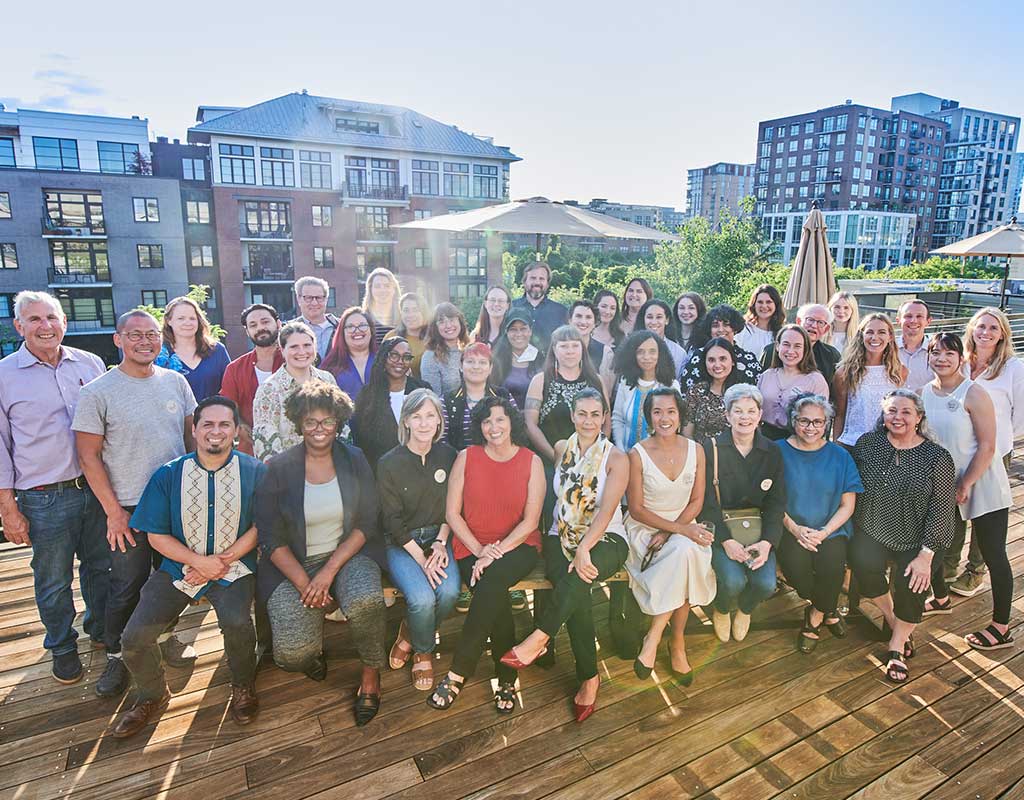
A group of Ecotrust staff and board members in June 2023. Photo credit: Jason Hill
We are building an anti-racist, multiracial organization. This requires us to recognize and support the leadership of individuals and communities most impacted by systemic oppression. Over the last several years, Ecotrust has worked to transform our employment and promotion practices, leading to more racially equitable outcomes in hiring and advancement. Ecotrust also seeks to create belonging and support for staff who identify as BIPOC in a number of ways, including through a new initiative called Pathways to Institutional Equity and a funded, self-organized BIPOC Affinity Group.
Ecotrust’s staff, leadership, and board increasingly reflect the experiences and perspectives of the bioregion. As of November 2024, 42 percent of Ecotrust’s Leadership Team, 49 percent of staff, and 64 percent of our Board identify as BIPOC.
From June 2022 and October 2022, Ecotrust was led by Co-Interim Executive Directors Olivia M. Rebanal and Kevin Bumatay, who identify as Filipina American and biracial Filipino American respectively. In late November, Kevin chose to depart Ecotrust after more than three years of incredible contributions to Ecotrust’s mission and culture. Olivia accepted the role of Interim Executive Director, continuing to serve as a visionary and tactical champion of our collective goals.
In late May of 2023, the Ecotrust board selected Ronda Rutledge as Ecotrust’s new Executive Director, after an extensive nationwide search and hiring process involving staff at all levels of the organization. Ronda began her tenure on June 1, 2023. A citizen of Cherokee Nation, Ronda is the first Native American to lead Ecotrust.
Partnerships at the center
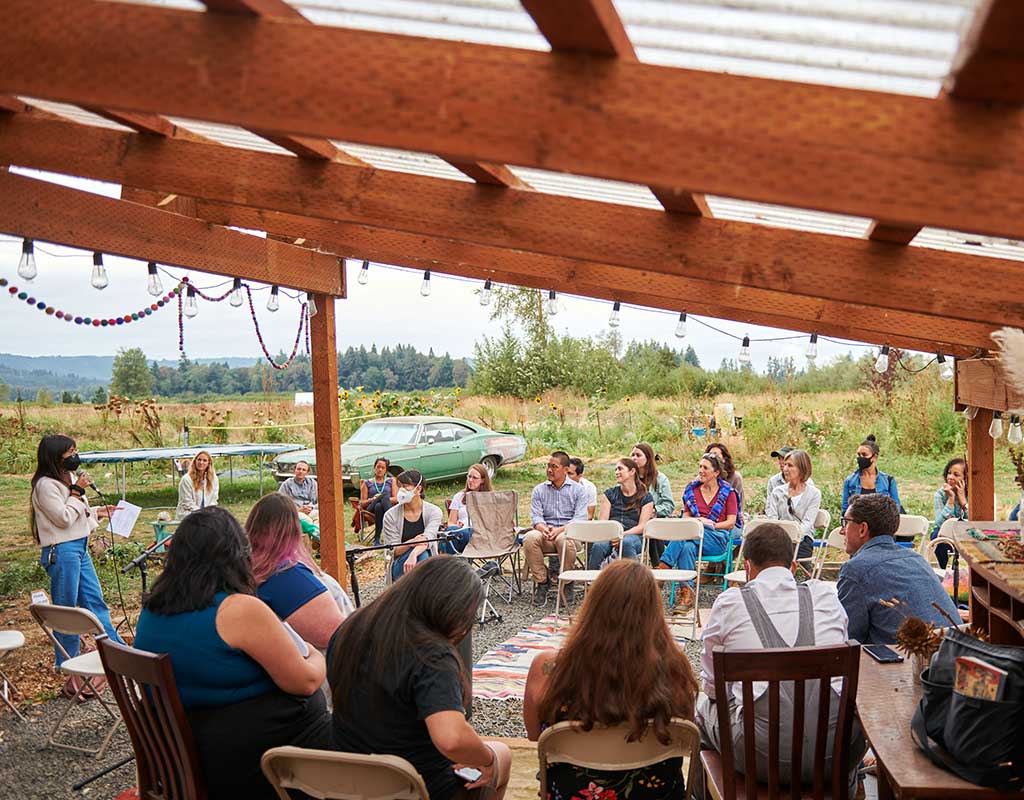
During a field trip to Wapato Island Farm in Portland, Ore., Ecotrust board and staff listen to a panel comprised of Ecotrust staff and partners. Photo credit: Jason Hill
Strong and sustained partnerships are critical to how we approach all of our work. We are committed to deepening existing relationships and developing new partnerships with BIPOC-led and/or -serving organizations, tribal governments, and Indigenous leaders and networks, as well as architects and builders, agricultural producers, policymakers, institutional buyers, researchers, and more.
In 2021, we worked with over 160 programmatic partners in our region, including 69 BIPOC-led organizations, to advance and co-create a more equitable, prosperous, just, and climate-resilient future.
For example, some of our programmatic partners include the Intertribal Timber Council and Hoopa Valley Tribe on climate-smart forestry; The Blueprint Foundation, Native American Youth and Family Center, Self Enhancement Inc., and Wisdom of the Elders on workforce development; and Mudbone Grown Farm, Black Food Sovereignty Coalition, Oregon State University Center for Small Farms, and Sakari Farms on equitable food systems.
Our work continues to evolve as we more intentionally prioritize building partnerships and programs that engage and center Black, Indigenous, and other communities of color, and we acknowledge we have more work to do. In 2021, 42 percent of our partners were BIPOC individuals or BIPOC-led organizations; 54 percent of trainees (via career education, capacity building, and other training programs) identified as BIPOC; 40 percent of business at Ecotrust’s Redd campus were BIPOC and/or women-owned; 100 percent of Redd campus business leases had equity covenants; 60 percent of Ecotrust event venders were BIPOC- and/or women-owned; and 40 percent of event vendors were LGBTQ+-owned.
Power-sharing, collaboration, transparency, & accountability
While more equitable hiring and advancement policies and practices have contributed to increased BIPOC representation at the staff, leadership, and board levels, we recognize that representation, while important, is not enough. Co-creating a workplace where all our colleagues can thrive and find belonging necessitates going beyond diversity and inclusion strategies.
Equity and justice cannot be achieved without also transforming how power is held and resources are distributed. Our Strategic Plan includes several strategies related to building more distributed leadership, transparent decision making, power sharing, and reimagined organizational structures, and we are in the early stages of operationalizing those tactics. To further institutionalize distributed leadership, Ecotrust staff are learning about and practicing different ways of making decisions, with an intention to cultivate a culture of agency, initiative taking, and shared accountability. In the coming years, Ecotrust will continue to assess and adapt leadership and organizational structures for more equitable outcomes.
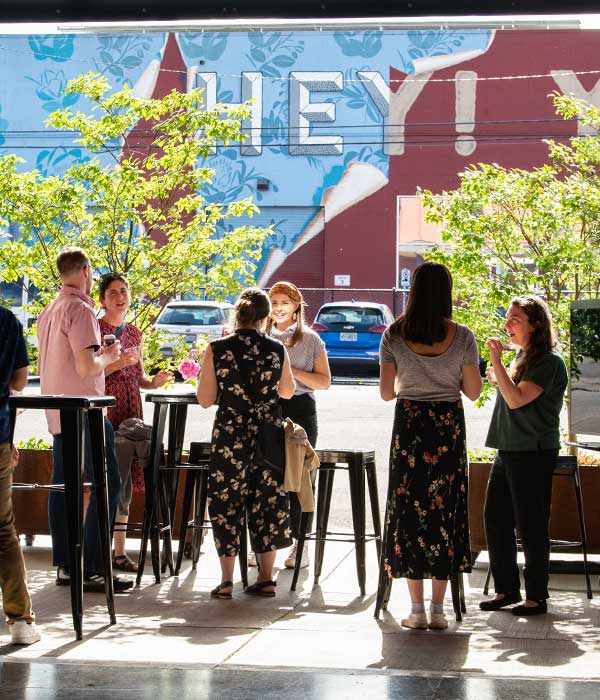
Ecotrust staff converse at the Redd on Salmon Street. Photo credit: Kim Nguyen
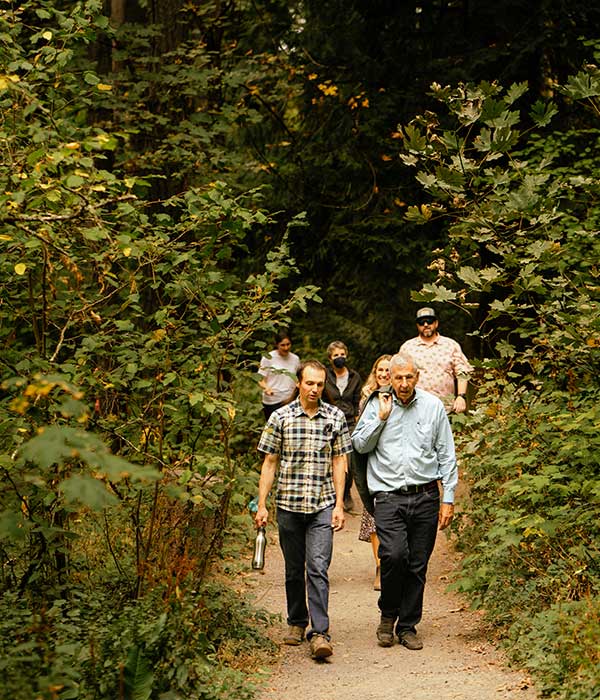
A board and staff field trip to Tryon Creek State Natural Area in Oregon. Photo credit: Sean Gutierrez
Continuing the work, enabling impact
While we lift up the progress that we’ve made, we know that we have so much more to learn and do in order to fully live our values. Transformation and change are not linear. We recognize that in order to be successful, our efforts must be active, continuous, and sustained over time. This iterative, continuous, and long haul work is designed to embed deeper levels of collaboration, transparency, and accountability throughout the organization and our partnerships.
As we do this work, we’re learning how important it is to grant ourselves the time and space to let go of perfectionism, provide direct feedback to one another, engage in generative conflict, embrace failure as opportunities to learn, and find ways to center joy and deeper levels of connection along the way. Everything we do, from internal efforts focused on building a culture of belonging, to external efforts focused on developing equitable partnerships, must be done in service to our mission and our collective work to advance ecological lands and water stewardship, promote climate resilience, and build broadly shared intergenerational wealth. We invite your partnership and feedback in this work. To get in touch, email us at contact@ecotrust.org.
ACKNOWLEDGMENTS and reports
Coalition of Communities of Color
Derron Coles, DRC Learning Solutions
Daryl Dixon, Cascade Employers Association
Cat Goughnour, Radix Consulting Group
Daesha Ramachandran, Tusk Consulting
Greg Wolley, Creating Tomorrow’s Workforce
Resolutions Northwest
Anita Yap, MultiCultural Collaborative
Bea Yeh Ogden, Asian Pacific American Network of Oregon and Zenger Farm
In recognition of their service, vision, and leadership, we express our heartfelt gratitude to the members of the Equity Working Group:
Brody Abbott (former staff)
Allison Brinkhorst
Kevin Bumatay (former staff)
Laura Ford
Brittanie Grayson
Stephanie Gutierrez
Jamese Kwele
Maralea Lutino (former staff)
Vickie Owens
Lisa J. Watt (former staff)
Jamese Kwele
Keia Booker
Marissa “Mars” Correa